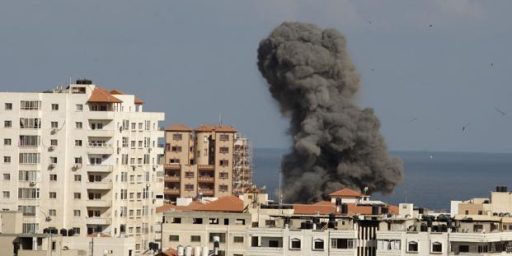U.N. Security Council Passes Lebanon Ceasefire Resolution
A joint U.S.-French effort to pass a resolution calling for an end of hostilities in Lebanon was unanimously approved Friday by the U.N. Security Council:
The Security Council agreed unanimously on Friday on a measure calling for a full cessation of hostilities in Lebanon, deploying 30,000 Lebanese and United Nations forces in southern Lebanon and calling upon Israel to withdraw its forces “in parallel.”
After rejecting earlier versions, Prime Minister Ehud Olmert of Israel accepted the resolution. But, under a deal an Israeli official said was approved by the United States, Mr. Olmert will wait until Sunday to obtain his cabinet’s approval. Until then, he will expand his monthlong military campaign against the Hezbollah militia and its rocket arsenal.
Mr. Olmert’s decision to accept the draft and yet continue with a stepped-up military offensive capped an evening of diplomatic brinksmanship and political gamesmanship that may help him deflect criticism of his handling of the war, castigated as tentative by the opposition and some in his own party.
Secretary General Kofi Annan said he would be in touch with the Lebanese and Israeli governments this weekend to determine when the full cessation of hostilities would take effect.
Contrary to the interpretation of the resolution being peddled by David Bernstein, the text of the resolution continues to call (as have previous resolutions) for the disarmament of Hezbollah throughout Lebanon and “the unconditional release of the abducted Israeli soldiers.”
As for Bernstein’s other complaints about the resolution, one suspects that the implementation of this ceasefire in its entirety–like most–will be problematic. However, the force to be deployed in southern Lebanon will be much larger, have a more substantial mandate, and be staffed by credibly neutral (if not pro-Israeli) forces from countries unlikely to collaborate with Hezbollah to launch further attacks. Given the precarious position of the Israeli government, and the general ineffectiveness of the current campaign in undermining Hezbollah’s operational capacity, this ceasefire is probably the best and most realistic option for Israel at this time.
Update: Bernstein disputes my characterization of this paragraph as calling for Hezbollah to release the soldiers it abducted, the action which sparked the conflict:
Emphasizing the need for an end of violence, but at the same time emphasizing the need to address urgently the causes that have given rise to the current crisis, including by the unconditional release of the abducted Israeli soldiers[.]
I admit it’s written in bureaucratese, but I’m curious what other plausible interpretation this paragraph can have. And, no, I’m not in the mood to drag out my international organizations law casebook (which I think is in a box in my office downtown anyway).





Once again, the UN has demonstrated its uselessness. The diplomats are so out of touch with reality that it is scary. It boggles my mind to understand why we in the US continue to participate in a body of the worlds most useless persons.
This so called agreement will sooner, rather than later, turn up to bite the free world right in the rear end.
In the meantime, we will see every UN member pat themselves for their “good work” in passing a resolution that will be another 1559.
Worthless.
I’m at a loss as to what makes this agreement “useless” – it gets Hezbollah out of southern Lebanon, puts an effective military force that isn’t Israeli or American (which IMHO is a good thing for regional tensions) in the buffer zone formerly occupied by Israel, and gives the Lebanese government a fighting chance of reestablishing true sovereignty over its own territory for the first time since 1970 or so.
There are simply no better options on the table. Israel has neither the military capacity nor the will to eradicate Hezbollah in Lebanon (heck, in four decades of occupation of the West Bank and Gaza, it hasn’t even been able to get rid of the far less formidable Palestinian terror groups, with full control of the borders and a standing occupation force). And neither does any other western power.
Chris,
For one thing, that language is in the preamble, not the text of the resolution.
This is worth a read. As always, Col Lang’s insight into the Lebanon crisis has been very sharp.